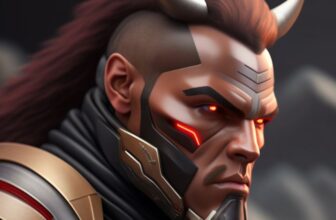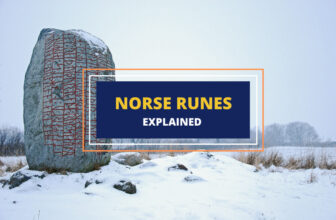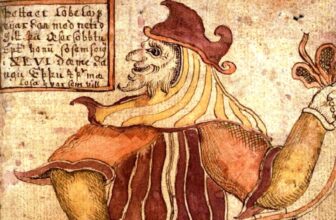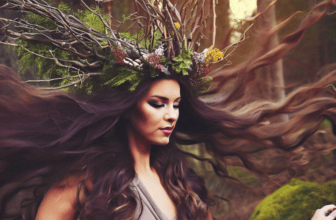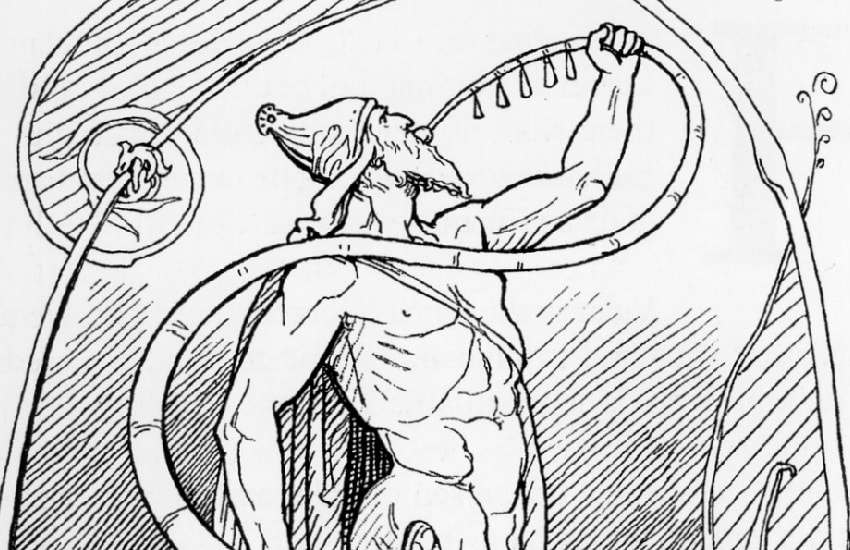
Table of Contents
Heimdall is one of the Aesir gods in Norse mythology with a very clearly defined purpose. Unlike most other deities who are connected with abstract concepts like the sea, the sun, or the earth, Heimdall is the watchful protector of Asgard. A divine sentry armed with superior sight, hearing, and foreknowledge, Heimdall is the lone guardian of the gods.
Who is Heimdall?
Heimdall is famous as the guardian of Asgard. A god who has willingly accepted a life of quiet watchful duty, he is always looking over Asgard’s borders for any imminent attacks from the giants or other Asgardian enemies.
Heimdall, or Heimdallr in Old Norse, is one of the few gods who’s name historians still don’t fully understand. The name may mean the one who illuminates the world while other scholars think the name may be connected to Mardöll – one of the names of the Vanir goddess Freya, herself a guardian protector of the Vanir pantheon.
Regardless of the meaning of his name, Heimdall performs his duty throughout all of human history up until the end of days.
Heimdall is said to have such keen eyesight, that he can see for hundreds of miles even at night. His hearing is so sensitive that he can the grass growing in the fields. He also has a certain foreknowledge of upcoming events similar to that of Odin’s wife, the goddess Frigg.
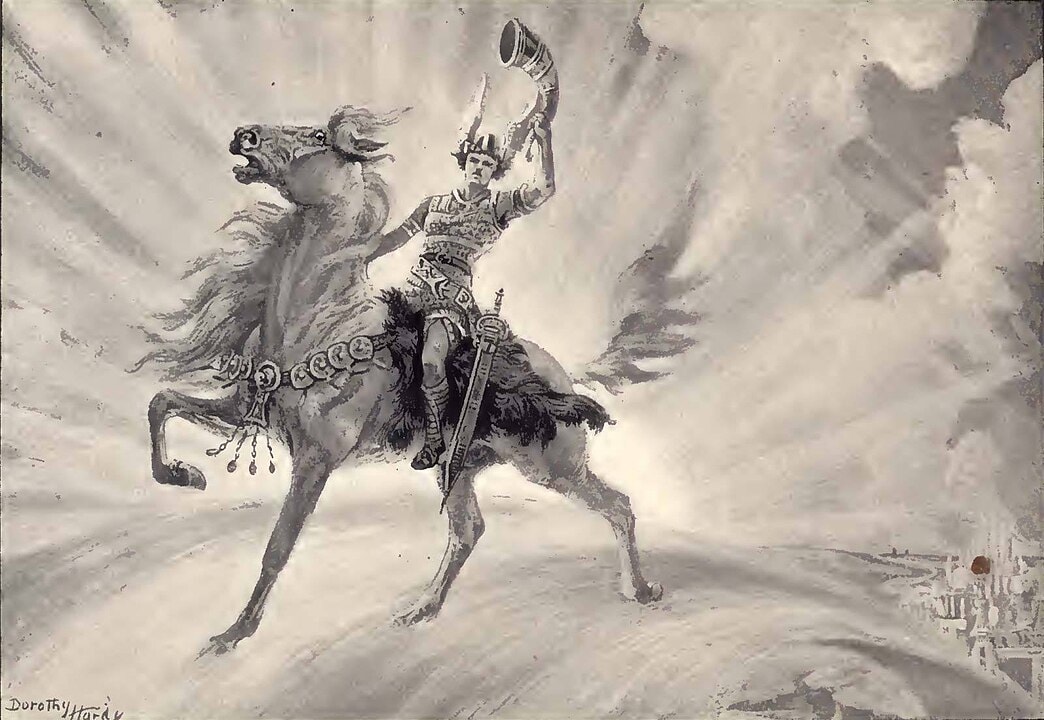
Heimdall has the horn, Gjallarhorn, which he blows to sound the alarm when enemies approach. He sits on Bifrost, the rainbow bridge that leads to Asgard, from where he watches vigilantly.
The Son of Nine Mothers
Like most other Norse gods, Heimdall is a son of Odin and therefore a brother of Thor, Baldur, Vidar, and all the other sons of the Allfather. However, unlike most other Norse gods, or normal living beings for that matter, Heimdall is the son of nine different mothers.
According to Snorri Sturluson’s Prose Edda, Heimdall was born by nine young sisters at the same time. Many scholars speculate that these nine maidens may be the daughters of the god/jötunn of the sea Ægir. As Ægir acts as a personification of the sea in Norse mythology, his nine daughters represented the waves and were even named after nine different Old Norse words for waves such as Dúfa, Hrönn, Bylgja, Uðr, and others.
And there lies the problem – the names of Ægir’s daughters don’t match with the nine names Snorri Sturluson gives for Heimdall’s mothers. This is an easy problem to ignore, as it’s very common for Norse deities to have multiple different names depending on the source of the myth.
Living in a Fortress Atop a Rainbow
Waiting for Ragnarok on a dry mouth can be understandably annoying so Heimdall is often described as drinking delicious mead while watching over Asgard from his fortress Himinbjörg.
That name literally means Sky Cliffs in Old Norse which is fitting as Himinbjörg is said to have been located on top of Bifrost – the rainbow bridge that leads to Asgard.
Wielder of Gjallarhorn
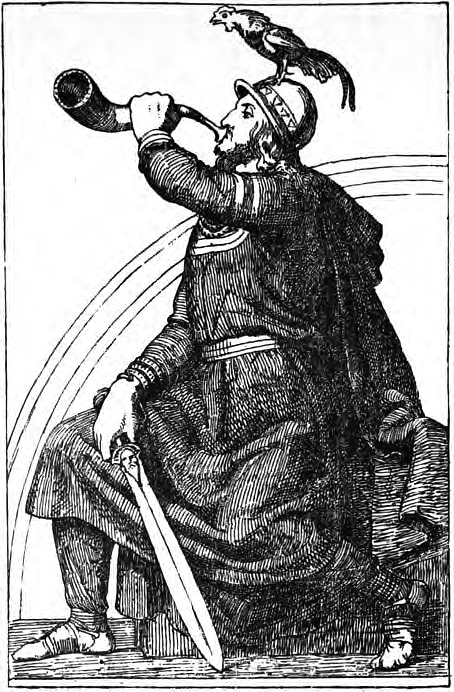
Heimdall’s most prized possession is his horn Gjallarhorn which literally means Resounding Horn. Whenever Heimdall spots incoming danger, he sounds the mighty Gjallarhorn which all of Asgard can hear at once.
Heimdall also owned the golden-maned horse Gulltoppr which he rode both into battle and at official proceedings such as funerals.
The God Who Established Human Social Classes
Given that Heimdall is described as a sort of a “loner god” it’s curious that he was credited as the Norse god who helped the people of Midgard (the Earth) establish their societies and social classes.
In fact, if certain verses of Norse poetry are taken together, Heimdall seems to also have been worshipped as the father god of humankind.
As for the Norse hierarchal classes which Heimdall established, they typically consisted of three levels:
- The ruling class
- The warrior class
- The working class – farmers, traders, craftsmen and so on.
It is a rather primitive hierarchal order from today’s point of view but the Nordic and Germanic people at the time were satisfied with it and praised Heimdall for arranging their world in such a way.
Heimdall’s Death
Sadly, like most other stories in Norse mythology, Heimdall’s long watch will end in tragedy and death.
When Ragnarok begins, and the giant hordes run up Bifrost led by the traitor god of mischief Loki, Heimdall sound will sound his horn in time but that still won’t prevent the disaster.
During the great battle, Heimdall will face off against none other than the trickster god Loki, and the two will killl each other in the middle of the bloodshed.
Symbols and Symbolism of Heimdall
As a god with a very straight-forward mission and character, Heimdall didn’t really symbolize a great many things like most other deities. He wasn’t associated with natural elements nor did he represent any particular moral values.
Still, as Asgard’s faithful watch and guardian, his name was often invoked in war and he was the patron god of scouts and patrols. As the originator of Norse societal order and the potential father of all mankind, Heimdall was universally worshipped and beloved by most Norse societies.
Heimdall’s symbols include his Gjallarhorn, the rainbow bridge and the golden horse.
Importance of Heimdall in Modern Culture
Heimdall is frequently mentioned in many historical novels and poems and has often been depicted in paintings and statues. He’s not as frequently depicted in modern pop-culture but certain mentions can still be found such as Uriah Heep’s song Rainbow Demon, the video games Tales of Symphonia, Xenogears, and the MOBA game Smite, and others.
Most famous of all, however, is Heimdall’s appearance in the MCU movies about the god Thor. There, he’s played by the British actor Idris Elba. The portrayal was surprisingly faithful to the character in comparison to all the other mostly inaccurate portrayals of Norse deities.
The notable inaccuracy is that Idris Elba is of Sierra Leonean descent while the Norse god Heimdall is specifically described in Norse myths as the whitest of the gods. That’s hardly a major issue given all the other inaccuracies in the MCU movies.
Wrapping Up
Heimdall remains one of the most popular of the Aesir gods, known for his specific role as guardian of Asgard. With his keen hearing and eyesight, and his horn ever at the ready, he remains sitting on Bifrost, vigilantly looking out for approaching danger.




